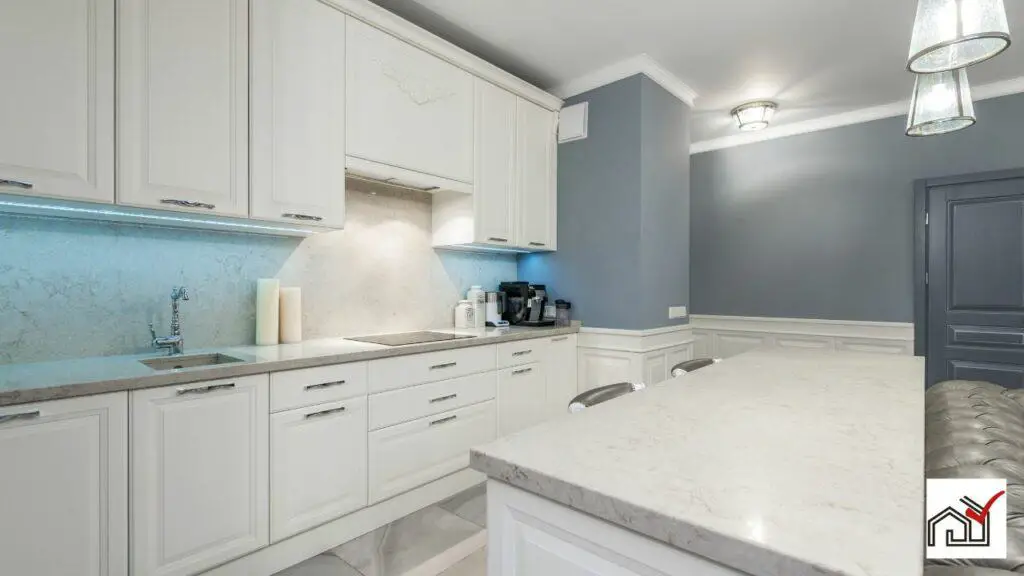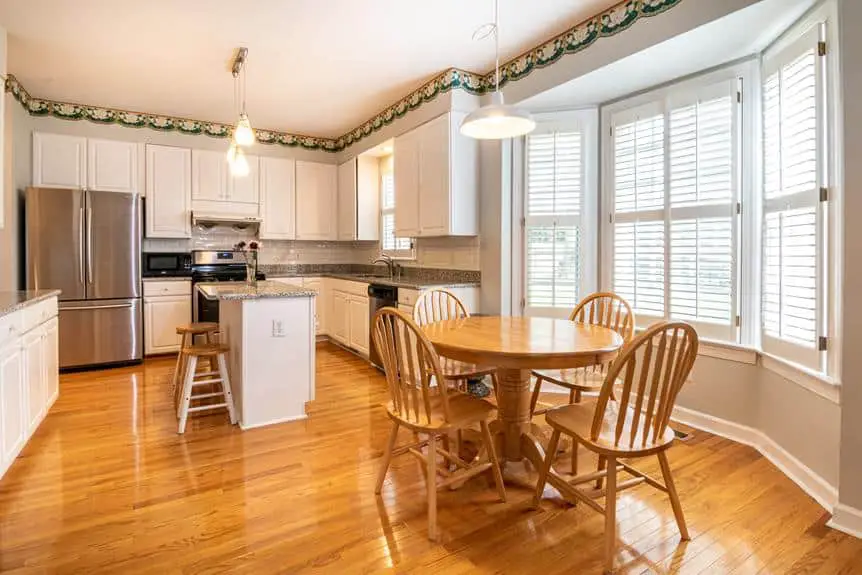To fix dull spots on quartz or granite countertops, begin by identifying the cause, which could be stains or etching.
Clean the surface with a pH-neutral cleaner.
For stubborn dull spots, use appropriate household remedies or commercial products.
Apply polishing and buffing techniques to restore shine.
Preventative maintenance is essential to preserve the countertop's appearance.
This guide outlines the steps to address dull areas and maintain the surface's luster.
Identifying Dull Spots
Homeowners may notice dull spots on quartz or granite countertops, which appear less shiny and even than the surrounding areas. These spots can look cloudy and disrupt the polished finish of the countertop. Identifying these spots is the first step in countertop repair.
Dull spots can be caused by heat, abrasive cleaners, or acidic substances that damage the countertop's resins. To address these spots, one must first understand their cause. If the dullness is due to surface smudges or streaks, a quartz-specific polishing compound can restore shine.
For persistent dull spots, avoid using harsh chemicals or abrasive pads that could worsen the issue. Instead, use gentle, pH-neutral cleaners recommended by the manufacturer and apply with a soft cloth.
If these methods do not work, professional help may be necessary. Professionals have the expertise and equipment to buff and polish the affected areas safely. Proper techniques and products can help maintain the countertop's durability and appearance.
Cleaning Surface Contaminants
To clean quartz or granite countertops and restore their shine, start by mixing mild dish soap with warm water. Use a damp, soft cloth to wipe the surface, which will remove debris and minor stains without harming the stone.
For tougher residues, a mixture of vinegar and water can be applied with a soft cloth to cut through grease and water stains while protecting the sealant. Alternatively, some glass cleaners are suitable for natural stone and can provide a streak-free finish, but their compatibility should be verified.
For persistent stains, create a paste with baking soda and water, apply it to the stain, and after a few minutes, gently scrub with a soft cloth. Baking soda is a mild abrasive and can lift stains without scratching the stone.
Regular cleaning and immediate attention to spills help maintain countertop appearance. For deep-set contaminants or widespread dullness, consider hiring a professional cleaner.
Applying Homemade Solutions
To remove dull spots from quartz and granite countertops, a homemade paste using baking soda can be effective. Mix baking soda with a little warm water to form a paste with a similar consistency to toothpaste. Apply this paste to the dull areas on the countertop.
For quartz, spread the paste evenly. For granite, use the same approach. Gently rub the paste onto the surface with a clean cloth using circular motions to lift the stain without scratching the stone.
Let the paste sit for a short time to work on the stain, but avoid leaving it on for too long as it could damage the countertop. Afterward, rinse off the paste with water and wipe the area with a damp cloth.
If the stain remains, you can enhance the paste by adding a few drops of liquid dish soap. Apply the new mixture in the same way and make sure to rinse it off completely to prevent soap residue, which can cause more dulling.
These home remedies are affordable and can keep your quartz and granite countertops looking shiny without using harsh chemicals or seeking professional help for small imperfections.
Utilizing Commercial Products
Commercial products can be effective for restoring shine to dull areas on quartz and granite countertops. These products, specifically formulated for stone surfaces, contain polishing agents that are more effective than common household cleaners. They can remove stains and dullness that homemade solutions may not address. It is important to select a product designed for quartz or granite to prevent damage.
For persistent stains or dull spots, quartz polish or restoration kits are designed to deal with these problems directly. These kits typically include cleaning solutions and polishing pads. Following the provided instructions is essential for achieving the best results and preserving the countertop's condition.
The Magic Eraser is another option for removing tough stains and can be used on quartz and granite with caution to prevent surface damage.
Using the right commercial products as directed can enhance the appearance of your countertop and maintain its original luster.
Polishing and Buffing Techniques
Polishing compounds and buffing pads are essential for restoring shine to dull areas on quartz and granite countertops. Apply a high-quality compound appropriate for the material to the dull spot. Use a soft cloth or a low-speed buffer with a pad to work the compound in circular motions gently.
Avoid using abrasive scrubbers or harsh chemicals that could worsen the dullness or damage the surface. For quartz, which is sensitive to acidic substances, use a pH-neutral polishing compound.
For granite, start with coarser grit pads and progress to finer grits to achieve a glossy finish. Maintain even pressure and motion to prevent new dull spots or scratches.
Stone restoration professionals may be necessary for tough cases, as they have specialized tools and compounds not typically available to consumers.
Regular cleaning and avoiding abrasive cleaners can help prevent new dull spots, reducing the need for frequent polishing and buffing.
Preventative Maintenance Tips
To maintain quartz or granite countertops, regularly clean them according to the manufacturer's instructions. Use cleaners made for quartz or granite to avoid damaging the surface. Do not use harsh chemicals, acidic solutions, or rough scrubbing tools as they can scratch and dull the countertop.
Dry the countertop after cleaning to prevent water spots from minerals. Clean up spills immediately, especially acidic ones like wine or tomato sauce, to avoid staining.
Apply a sealant as directed by the manufacturer to protect against stains and damage. Use trivets or hot pads to protect the countertop from heat and prevent cracks.
For any uncertainties about caring for your stone surfaces, consult a professional for advice on maintaining their condition.




